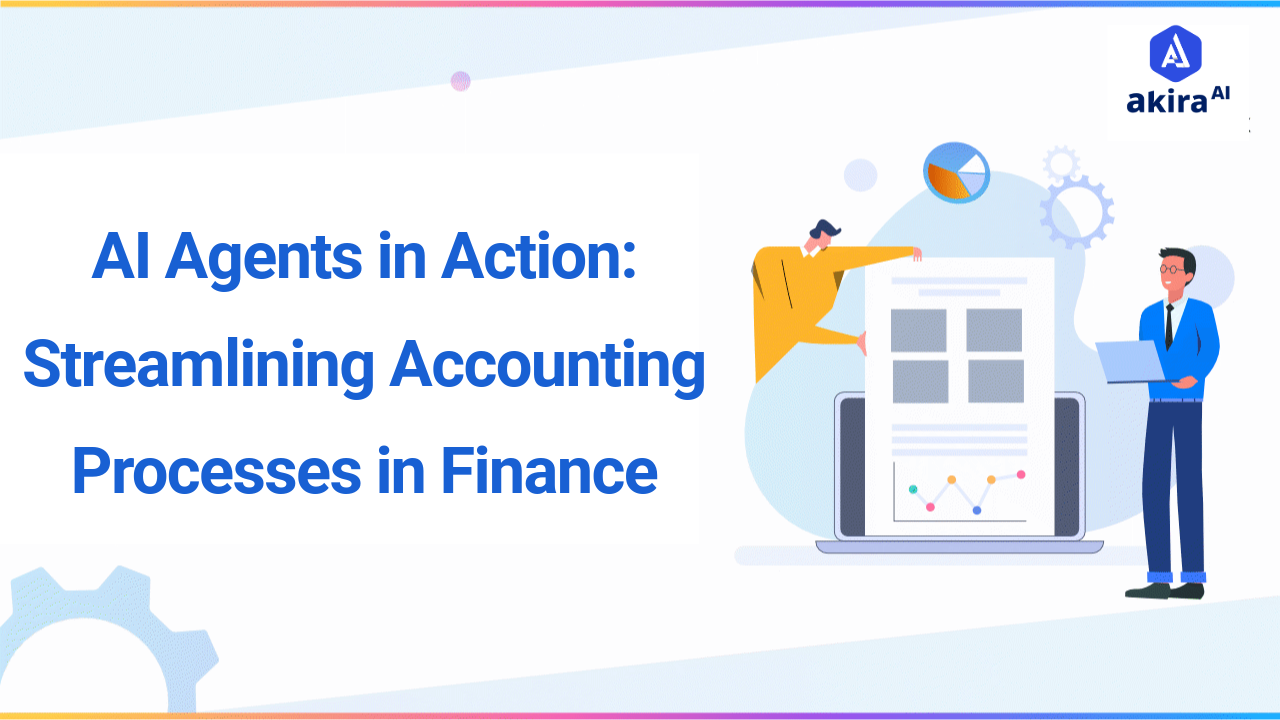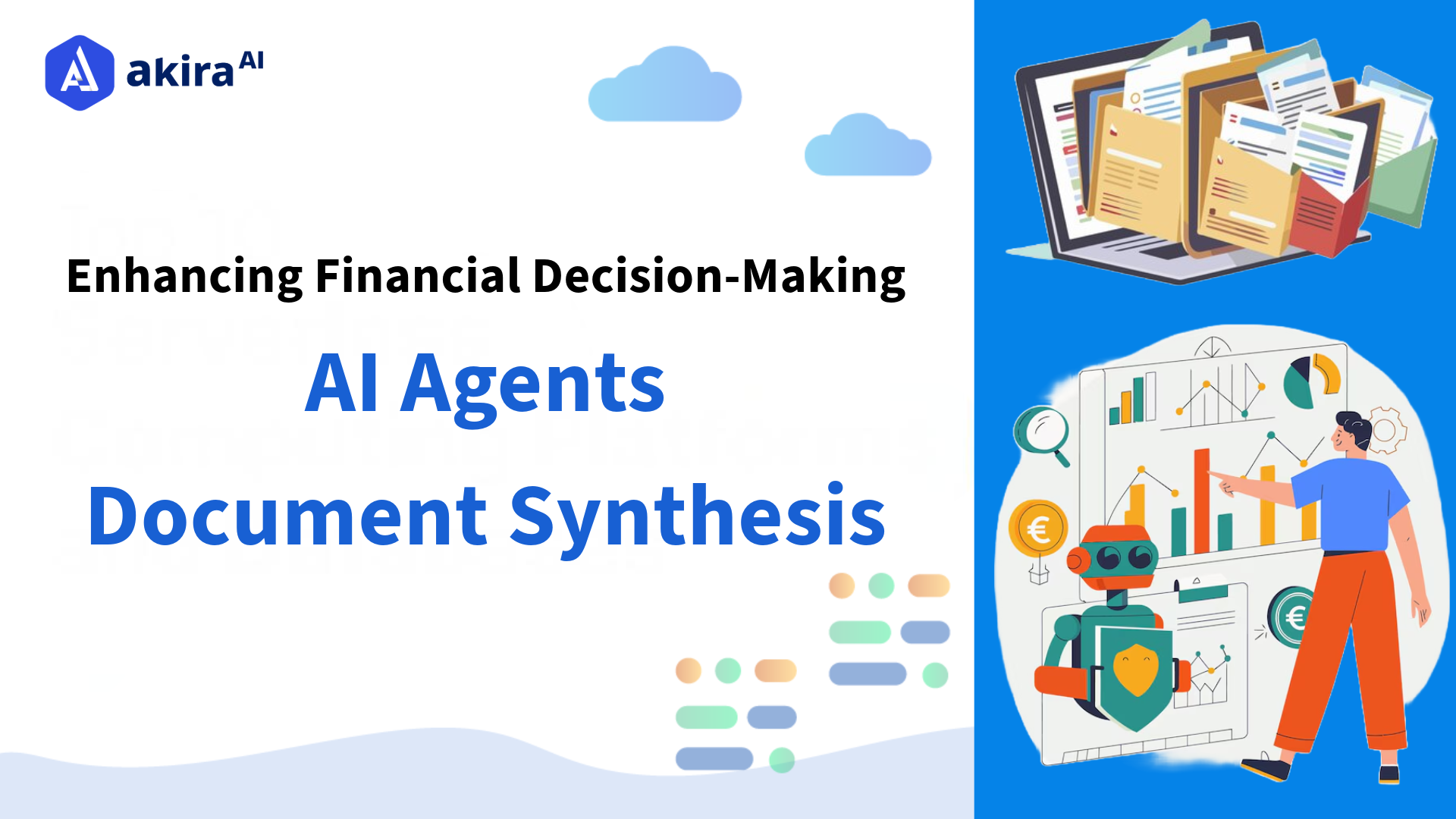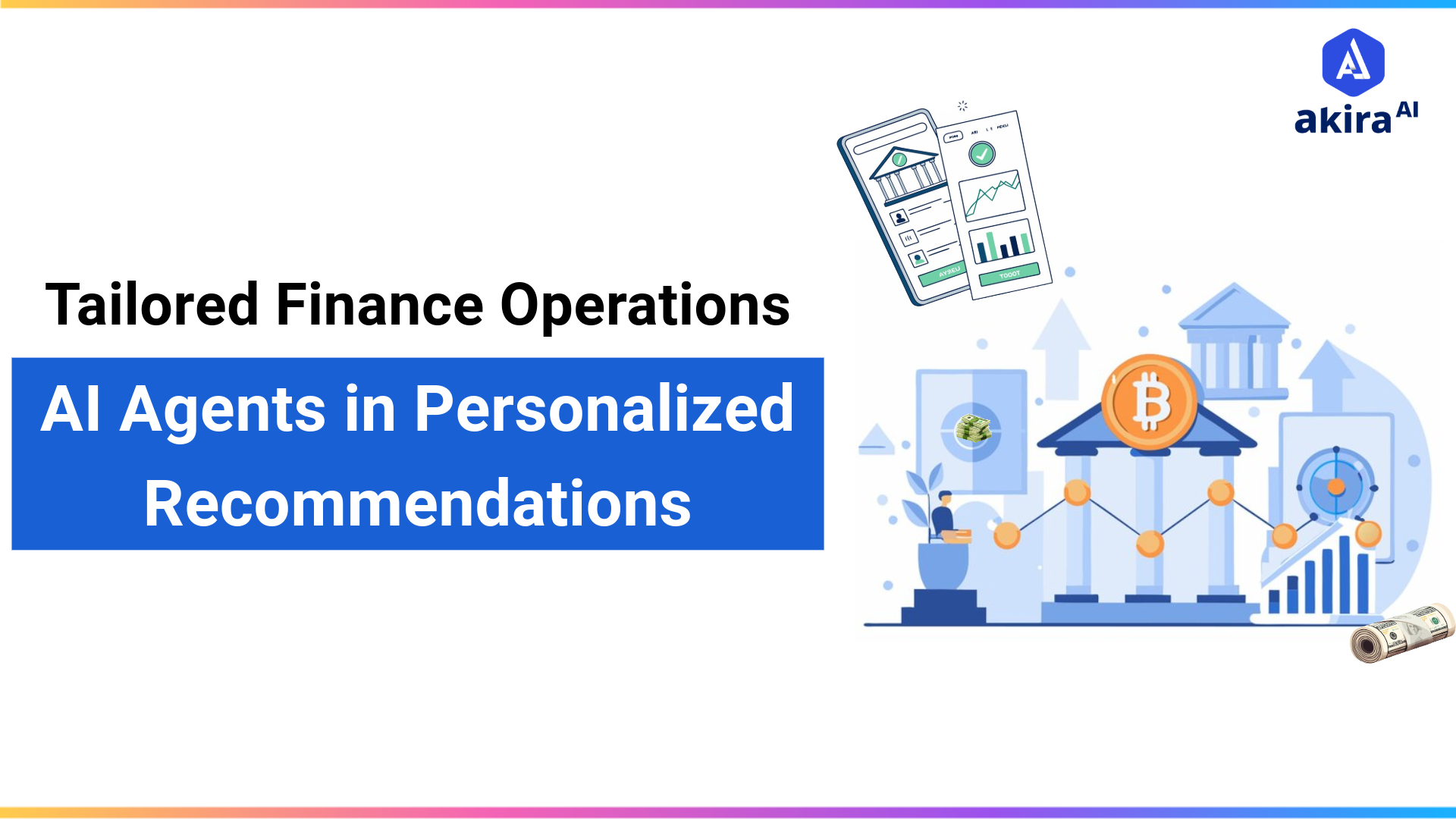In the rapidly evolving finance sector, staying compliant with complex regulations is crucial. Financial institutions must navigate a maze of rules to combat fraud and money laundering. Akira AI's agents addresses this need by automating compliance processes with advanced AI. This innovative approach reduces risk and boosts efficiency, allowing businesses to maintain stringent compliance while focusing on growth and innovation. Discover how Akira AI is redefining financial compliance and empowering organizations to excel in a regulated environment.
What is Financial Compliance in Finance?
In finance, adherence to rules is very significant, and in this respect, the multi-agent system has become an important aspect. These AI agents change how compliance in the ordinary sense is done, upgrading the usual wholly human-centric strategy with more automation. They continuously check transactions and data for anomalies and possible breaches of rules during the actions and on their finding, the agents swiftly fix compliance-related methods and procedures using their competence in managing complex financial systems by verifying all actions against laws and regulations.
A Brief Overview of Financial Compliance
Financial compliance in the finance industry ensures organizations adhere to laws, regulations, and standards to maintain integrity and avoid penalties. In the context of multi-agent systems (MAS), this becomes even more critical as multiple agents, both AI-driven and human, must work together while ensuring strict compliance with regulations like GDPR, SOX, and KYC. Multi-agent systems streamline compliance by automating complex tasks such as data collection, reporting, and audit checks, reducing human error. These systems can also enhance real-time monitoring by flagging discrepancies or regulatory violations instantly, ensuring ongoing compliance and reducing the risk of financial misconduct.
By utilizing agentic workflows, agentic AI, and machine learning, multi-agent systems help financial institutions stay agile, quickly adapting to changing regulations without delays. They automate data governance and security, ensuring compliance with privacy regulations like GDPR and securing financial data through encrypted transactions. These systems also provide transparent, traceable audit logs, allowing financial organizations to easily prepare for audits. With AI-powered predictive capabilities, multi-agent systems can anticipate compliance issues before they arise, offering businesses the tools they need for flawless financial compliance in an increasingly complex regulatory environment.
Comparison with Traditional AI Solutions
Akira AI’s solution stands out in several key areas when compared to traditional AI solutions:
|
Aspect |
Traditional Financial Compliance |
AI-Based Financial Compliance |
|
Process |
Manual, labor-intensive, rule-based |
Automated, adaptable, data-driven |
|
Scalability |
Limited, costly to scale |
Easily scalable with AI agents |
|
Decision-Making |
Centralized and hierarchical
|
Distributed, autonomous, responsive |
|
Accuracy and Efficiency |
Prone to human error, slower |
High accuracy, real-time monitoring |
|
Cost-Effectiveness |
Higher due to manual resources |
Lower due to automation |
|
Adaptability to New Regulations |
Slower adaptation to regulatory updates |
Rapid, dynamic adaptation |
Challenges in Financial Compliance
Managing compliance in the industry of financial services is a difficult challenge:
-
Regulatory Complexity: The number and the complexity of various regulations that any financial institution needs to consider are simply overwhelming. Constantly changing rules also means that organizations have to keep pace with it and change processes.
-
Information overload: It compels financial institutions to have to work with a volume of information emanating from customer transactions, credit histories, and external databases. In human terms, this is quite overwhelming—both to handle and thereafter analyze for compliance.
-
Real-time detection: It is paramount in the case of any accountability requirements, but traditional methods usually lack in this area. Such delays in detection and reporting may finally result in serious regulatory breaches and heavy fines.
-
Data Privacy and Security: Ensuring security and privacy of sensitive financial data, at the same time keeping regulations in tune with it further makes the process of compliance more difficult.
Akira AI's Agentic AI Solution
Akira AI addresses these challenges with its Agentic AI solution, designed specifically for financial compliance. The system is composed of an agentic workflow with several specialized AI agents, each designed to handle a specific task within the compliance process.
.png?width=1921&height=1081&name=image%20(4).png)
Process Flow
-
Customer Onboarding
The KYC and Due Diligence Agent autonomously verifies and approves new customers by conducting Know Your Customer (KYC) checks and due diligence.
-
Transaction Monitoring and Sanctions Screening
The Transaction Monitoring and Sanctions Screening Agent continuously monitors transactions, flags large transactions and new account openings for suspicious activities, and ensures compliance with sanctions lists.
-
Risk Assessment and Data Security
The Risk Assessment and Data Security Agent performs continuous risk assessments and ensures that operations adhere to data privacy and security standards.
-
Data Compliance Check
The Data Compliance Check Agent verifies that all processed data complies with regulatory standards and ensures adherence to applicable regulations.
-
Compliance Reporting
The system independently generates compliance reports and notifications to confirm that all finance operations have been conducted correctly and in compliance with regulatory requirements.
Technological Stack
Our composite AI framework utilizes the components from traditional machine learning to advance multi-agent systems:
|
Layer |
Component |
Stack |
|
Multiagent Layer
|
Agents |
For agent development, we have been using advanced agent frameworks like langchain, langraph, and Autogen. |
|
RAG (Retrieval Augmented Generation) |
Langchain, llama index frameworks, and knowledge Graphs utilized for building RAG pipelines |
|
|
Traditional ML |
IDP |
Integrated Document Processing (IDP) for KYC |
|
Orchestration layer |
Agent Orchestrator |
Guardrails: Azure OpenAI Content Filter or custom implementation of guardrails Multi-Agent System: AutoGen, LangGraph for complex agent interactions |
|
Data Layer |
Data Pipeline |
We employ industry-leading databases and data pipelines, such as PostgreSQL for structured data and Qdrant for vector data. |
|
Backend |
Backend pipelines |
Built using industry best practices to develop secure and scalable APIs. |
|
Frontend |
User Interface |
Developed using industry best practices to ensure a secure and user-friendly interface. |
|
Infrastructure layer |
Infrastructure |
Utilizes best-in-class infrastructure options, including on-premises, cloud-based, and hybrid solutions. |
Akira AI Multi-agent in action
1. Master Orchestrator Agent
The central command unit that directs respectively, the overall automation of the compliance process. It would accord with agentic workflow by delegating the tasks to other agents so that at every stage in the compliance process each step is derived free of any errors.
It relies on an LLM for higher-order decision-making. The knowledge graph captures the compliance data, rules, and relationships related to this domain and integrates the results into the Master Orchestrator Agent. This agent ensures that all the subprocesses are executed in a fashion compliant with regulations.
2. KYC and Due Diligence Agent
The agent commissions it by onboarding the customer, performing very elaborate due diligence, and Know Your Customer checks for boarding each and every individual. It also sends API calls to external systems to verify an individual's identity and background check.
The solution utilizes an LLM that is specialized for compliance procedures and automates due diligence with minimal human touch, ensuring very high accuracy. In agent verification, the agent chooses either to accept or reject the onboarding process.
3. Risk Assessment and Data Security Agent
This agent ensures the continuity and independence of the review regarding the occurrence of any potential risks concerning data security-related risk assessment.This agent is using a pre-trained domain LLM on financial regulations and risk management protocols.
It uses the rules-based system to ensure operations meet the standard in the industry. It checks if data processes meet compliance requirements through generating reports or alerting whether devices are not working accordingly.
4. Transaction Monitoring and Sanctions Screening Agent
This agent autonomously monitors transactions in real-time, ensuring that all financial activities comply with sanctions and anti-money laundering (AML) regulations. It flags any suspicious transactions for further investigation. If a transaction is flagged, the agent autonomously prepares and submits a Suspicious Activity Report (SAR) and alerts the compliance team.
5. Final Processing
After all the agents have finished their processing, a final data compliance check is performed. This ensures that all necessary information has been collected and verified according to regulatory standards. The system then proceeds to generate a comprehensive report summarizing the compliance process and its findings.
This report includes details from various stages of the compliance workflow, such as KYC results, risk assessments, and any flagged transactions. The system marks the compliance process as done. If any suspicious activities were detected during the process, the SAR Filing and Reporting Agent prepares and submits a Suspicious Activity Report to the appropriate authorities.
Use Cases and Application of Financial Compliance in Finance
Agentic AI and multi-agent systems excel in various compliance applications:
-
Transaction Monitoring: AI agents analyze real-time transaction data to identify anomalies and flag suspicious activity.
-
Risk Management: Multi-agent systems can continuously assess risk by monitoring market fluctuations and generating insights for real-time decision-making.
-
Fraud Detection: Specialized agents detect unusual patterns across large datasets, helping to reduce false positives and increase detection accuracy.
-
Regulatory Reporting: AI agents streamline the aggregation and reporting of data for compliance audits, reducing preparation time and ensuring timely submissions.
-
Data Privacy Compliance: Multi-agent systems ensure data handling complies with regulatory standards, such as GDPR, by automating access controls and data encryption checks.
The Operational Benefits of AI Agents for Financial Compliance in Finance
Akira AI’s compliance solution offers several key benefits:
-
Increased Productivity: AI agents are expected to handle 80% of compliance-related tasks by 2025, allowing human teams to focus on strategic roles.
-
Improved Efficiency: Multi-agent systems can boost efficiency by 25%, as automated workflows reduce manual oversight and streamline operations.
-
Higher Accuracy: Error rates decrease as AI agents follow structured, replicable workflows.
-
Cost Savings: With automation, firms save on labor costs, often realizing a return on investment within 1-2 years.
Technologies Transforming Financial Compliance
-
Natural Language Processing (NLP): NLP enables AI to interpret regulatory texts, automatically updating systems to align with new rules.
-
Machine Learning Algorithms: ML algorithms analyze transaction data in real-time, detecting anomalies that could signal compliance risks.
-
Blockchain Integration: Blockchain offers a transparent, immutable record for compliance processes, increasing data security and traceability.
-
Multi-Agent Systems (MAS): Specialized agents handle specific compliance tasks, from anomaly detection to fraud monitoring, enabling seamless workflows.
-
Robotic Process Automation (RPA): RPA automates repetitive, data-heavy tasks, such as reporting and documentation, cutting down on processing times.
The Future of Financial Compliance
-
Increased Autonomy: AI agents will likely operate with minimal human intervention, acting on real-time insights.
-
Real-Time Compliance Monitoring: Compliance will evolve from periodic audits to real-time monitoring, enhancing responsiveness.
-
Enhanced Interpretability: Multi-agent systems will become increasingly transparent, allowing firms to trace decisions and reduce regulatory risks.
-
Data-Driven Compliance Models: Future systems will base compliance on predictive analytics and behavioral data, minimizing human bias.
-
Collaborative AI Agents: Teams of AI agents will coordinate to handle large-scale compliance tasks seamlessly.
Conclusion:AI Agents for Financial Compliance
Akira AI’s autonomous solution is a transformative step forward in financial compliance, combining automation, scalability, and accuracy to relieve compliance teams of complex regulatory tasks. With a powerful multi-agent system, Akira AI addresses critical areas like fraud detection, transaction monitoring, and regulatory reporting, enhancing precision and reducing manual errors. Built for the dynamic world of financial regulations, Akira AI future-proofs organizations by offering resilience, minimizing operational costs, and ensuring real-time compliance. This scalable, secure solution allows financial institutions to stay compliant while focusing on strategic growth, positioning Akira AI as essential for compliance excellence in a rapidly changing regulatory landscape.


